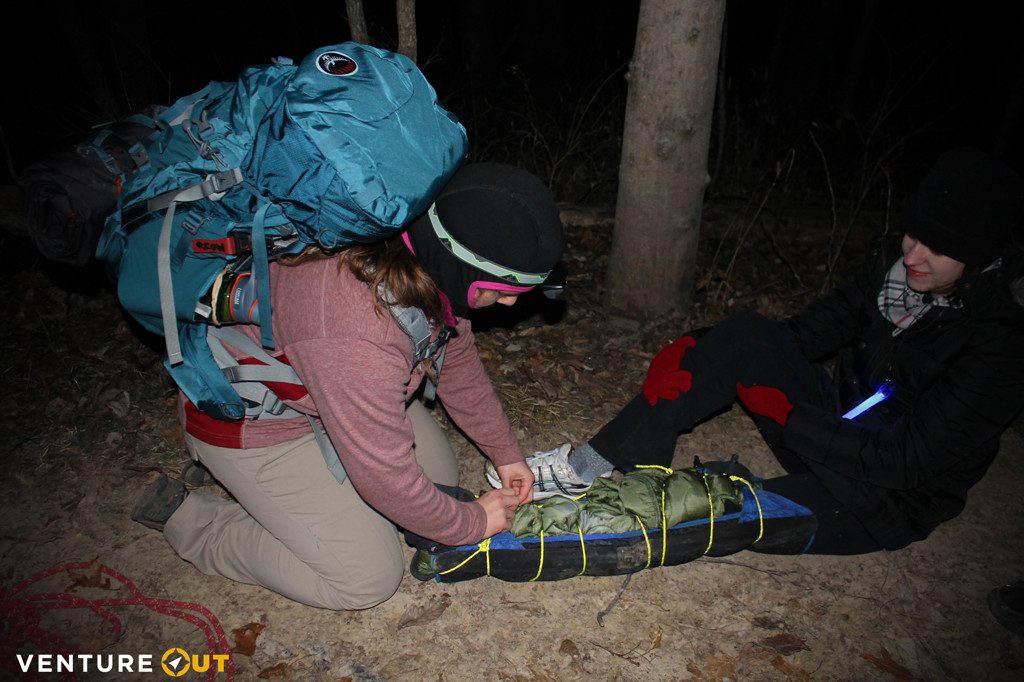Venture Out offers a Wilderness First Responder (WFR) training each year in January. People involved in outdoor activities (canoeing, backpacking, caving, hunting, fishing, rock climbing) or who plan to pursue an outdoor career should strongly consider this exceptional leadership opportunity. Many outdoor programs such as National Outdoor Leadership School (NOLS), Outward Bound and the federal government require a WFR certification for entry level positions. This course is open to all people of all ages and all experience levels, including MU students, high school students, boy and girl scout leaders, parents, teachers, medical professionals, and all other community members.
This 70 hour course is taught by an instructor from SOLO Wilderness Medicine. The Wilderness First Responder curriculum uses the principles of long-term care, improvised resources, and varying environmental conditions as the framework for learning. Created to provide outdoor leaders, guides, rangers and travelers with the knowledge needed to deal with crises in remote settings, this course meets and exceeds all DOT National Standards for First Responder with additional protocols for extended care situations. The emphasis of the WFR course is on prevention and decision-making. View an outline of what WFR covers.
****** Registration for Wilderness First Aid/First Responder will open in late fall. We will be promoting WFR/WFA registration on our social media platforms (Instagram and Facebook). Follow us to keep track of Venture Out’s program offerings!
Our WFR/WFA courses take place in January (dates to be determined). Our website will be updated once details have been finalized. ******
“I took the Wilderness First Responder course in 2012 as one of the adult leaders in our church’s youth backpacking trip to the Rocky Mountains. Cliff Stockton, the WFR instructor, did a great job of making the nine day class move quickly with a mix of in-depth material, challenging exercises, and stories from his experiences. I’ve used skills from the class on each of the three trips since I certified and often outside of the wilderness. Most important, the class gave me a basis for making hard decisions that were important to the students’ safety. I highly recommend the Wilderness First Responder course for anyone leading and participating in outdoor group activities.”
Matt Blotevogel, WFR 2012
SOLO Mission & Philosophy
SOLO’s mission is to provide opportunities for the highest quality education in an open forum, which promotes the exchange of information and ideas. Essential components of all SOLO programs, regardless of their specific focus, are the development of judgment and leadership skills and the promotion of community awareness with a focus on communication.
SOLO strives to continually offer intensive, innovative, and top-notch wilderness medical and rescue programs. Commitment to teaching and the active practice of wilderness and medical skills are paramount to SOLO instructors.

WFR Certifications
Students who successfully complete the SOLO Wilderness First Responder course will receive a SOLO Wilderness First Responder card and an American Heart Association Basic Life Support CPR card. Students looking for state First Responder certification should contact their home state’s Office of EMS since SOLO courses often meet or exceed state requirements. For instance, additional modules have been added to meet the Maine First Responder requirements so that, upon successful completion of the WFR, students can challenge the Maine First Responder tests. Within one year of the student’s original WFR course, the student has the option of taking a WEMT Part 2 with SOLO. Successful completion of this additional course results in National Registry EMT and SOLO Wilderness EMT certification.
Requirements
Certification is based on successful completion of the course. In order to do so, all certification candidates are required to participate in 100 percent of the course, as that is the best way to assess mastery of the skills involved. SOLO instructors provide on-going feedback and many opportunities for questions. Final assessment of each student’s skills includes written and practical exams.
The 70-hour curriculum takes place over eight days. A typical day consists of a mixture of hands-on practical skill work and didactic lecture sessions. To optimize learning potentials, SOLO compliments these sessions with a variety of mock scenarios and simulations. Known for their open-learning environments, SOLO courses are taught to audiences with a variety of learning styles.
SOLO WFR addresses issues of medical and legal concerns as well as blood borne pathogens and infectious diseases. The patient assessment system, the foundation of the course, trains students to determine what is going on with the back country patients. Other sessions provide instruction in traumatic situations as well as medical emergencies. Environmental emergencies such as hypothermia and heat injuries are dealt with in great detail. Practical simulations and labs provide practice in back country leadership and rescue skills.
Since some of the class time is outdoors (both day and night), SOLO asks that you come prepared for the time of year and environment in which you are taking your course. Sturdy boots, reliable rain gear, and outdoor items such as hats, gloves and headlamps are entirely appropriate. A gear list of required and recommended items will be sent to you with your registration.